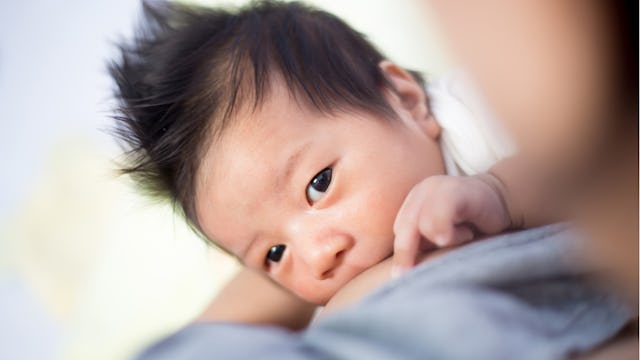Study Finds Any Amount Of Breastfeeding Reduces The Risk Of SIDS

Breastfeeding for at least two months cuts a baby’s risk of SIDS almost in half
A new study has determined one monumental benefit of breastfeeding: it can reduce the risk of Sudden Infant Death Syndrome (SIDS). Breastfeeding is known to be beneficial to the health of infants with boosting immunity and preventing conditions like asthma — though not all moms are able to exclusively breastfeed. For moms who may supplement with fomula, the study found any amount of breastfeeding will offer the same protection — both partial and exclusive breastfeeding equally reduce the risk.
According to the study, conducted by the University of Virginia School of Medicine, breastfeeding for at least two months shows a significant decreased risk in SIDS.
“Breastfeeding for just two months reduces the risk of SIDS by almost half, and the longer babies are breastfed, the greater the protection,” Fern Hauck, MD, of the UVA School of Medicine and the UVA Children’s Hospital told Science Daily. “The other important finding from our study is that any amount of breastfeeding reduces the risk of SIDS — in other words, both partial and exclusive breastfeeding appear to provide the same benefit.”
Researchers found that the longer moms breastfeed, the greater the protection against SIDS:
- Any breastfeeding for two to four months reduced risk by 40%
- Any breastfeeding for four to six months reduced risk by 60%
- Breastfeeding longer than six months reduced risk by 64%
- Breastfeeding for less than two months didn’t offer protection against SIDS
Many nursing moms supplement with formula because of inconsistent milk production — it’s very common, even if it’s frustrating. What’s great about these findings for all moms who breastfeed — regardless of the amount — is that moms don’t need to breastfeed exclusively for their baby to receive this particular benefit.
“These results are very powerful. Our study found that babies who are breastfed for at least two months have a significant reduction in their risk of dying from SIDS,” said researcher Kawai Tanabe, MPH, of the University of Virginia School of Medicine. “Breastfeeding is beneficial for so many reasons, and this is really an important one.”
Scientists involved in the study compared mothers in eight different countries in order to control the differences in cultural norms and make sure the results were accurate. All in all, the study compared 2,259 cases of SIDS with 6,894 cases of babies who did not die of SIDS to determine the results.
The study wasn’t able to determine why exactly breastfeeding helps protect babies against SIDS, but there are two possibilities researchers haven’t ruled out: the immune benefits, and the effect of breastfeeding on sleeping patterns.
Researcher Rachel Moon, MD, of the UVA School of Medicine and the UVA Children’s Hospital supports international breastfeeding efforts in infants for those first couple of months. “It’s great for mothers to know that breastfeeding for at least two months provides such a strong protective effect against SIDS.”